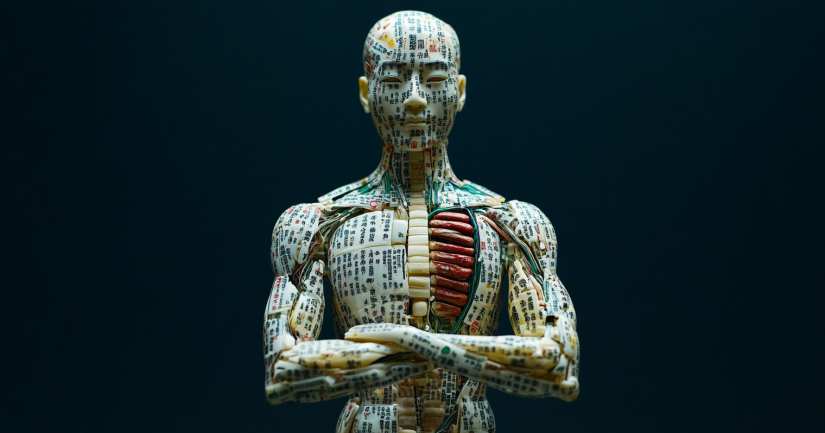
Learn about your body constitution in the Chinese Medicine Constitution Quiz, Discover Your Unique Body Type and Health Balance. The Chinese Medicine Constitution Quiz helps you identify your body constitution based on Traditional Chinese Medicine (TCM). TCM recognizes that each person has a unique constitution (体质, Tǐzhì), which influences health, digestion, emotions, and energy levels. Understanding your constitution allows you to make informed choices about diet, lifestyle, and herbal remedies to maintain balance and prevent illness. This quiz will reveal your dominant constitution type and provide insights into achieving optimal well-being.
TCM categorizes body types based on Qi (vital energy), Yin-Yang balance, Blood, and body fluids. Each constitution type has distinct characteristics, strengths, weaknesses, and dietary needs.
Want to uncover more about health and balance? Explore ancient wisdom with the Chinese Medicine Body Types Quiz, or go deeper into traditions with the Traditional Chinese Medicine Quiz. When you’re done exploring this topic you’ll definitely want to check out Chinese Medicine Elements Quiz for a zany twist. You’ll marveling as you compare your results and maybe see how zany life can be. Then saunter over to Which Chinese Zodiac Am I Quiz to see how your answers stack up.
Discover Your Results – Begin the Chinese Medicine Constitution Quiz
The Nine Body Types in Traditional Chinese Medicine
1. Balanced Type (平和体质, Pínghé Tǐzhì) – The Ideal State
- Personality: Adaptable, stable, and optimistic
- Physical Traits: Strong immunity, good digestion, and steady energy levels
- Common Issues: Few health concerns, but stress or poor lifestyle choices may disrupt balance
- Best Diet: A variety of fresh, whole foods with seasonal adjustments
Balanced individuals enjoy good health and resilience but should maintain a healthy lifestyle to prevent imbalances.
2. Qi-Deficient Type (气虚体质, Qìxū Tǐzhì) – The Energy Lacking
- Personality: Gentle, quiet, and sometimes fatigued
- Physical Traits: Weak immune system, shortness of breath, and frequent colds
- Common Issues: Fatigue, digestive discomfort, and poor stamina
- Best Diet: Warm, energy-boosting foods like ginseng, oats, and chicken soup
Qi-deficient individuals benefit from restorative foods, light exercise, and stress reduction techniques.
3. Yang-Deficient Type (阳虚体质, Yángxū Tǐzhì) – The Cold-Prone
- Personality: Calm, introverted, and prefers warmth
- Physical Traits: Cold hands and feet, low energy, and sensitivity to cold
- Common Issues: Slow metabolism, bloating, and joint pain
- Best Diet: Warming foods like ginger, cinnamon, and lamb
Yang-deficient individuals need warmth, physical activity, and circulation-enhancing foods to maintain vitality.
4. Yin-Deficient Type (阴虚体质, Yīnxū Tǐzhì) – The Heat Imbalance
- Personality: Active, passionate, but easily irritated
- Physical Traits: Dry skin, night sweats, and warm body temperature
- Common Issues: Insomnia, anxiety, and throat dryness
- Best Diet: Cooling foods like pears, lotus root, and herbal teas
Yin-deficient individuals must hydrate, avoid excessive stimulants, and practice relaxation techniques.
5. Phlegm-Dampness Type (痰湿体质, Tánshī Tǐzhì) – The Slow Metabolism
- Personality: Laid-back, prefers a slower pace
- Physical Traits: Prone to weight gain, bloating, and sluggish digestion
- Common Issues: Mucus buildup, fatigue, and water retention
- Best Diet: Light, detoxifying foods like radish, barley, and green tea
Phlegm-damp individuals should reduce heavy, oily foods and stay active to improve circulation.
6. Damp-Heat Type (湿热体质, Shīrè Tǐzhì) – The Heat Excess
- Personality: Outgoing, intense, and emotional
- Physical Traits: Oily skin, excessive sweating, and a tendency toward inflammation
- Common Issues: Acne, digestive discomfort, and irritability
- Best Diet: Bitter and cooling foods like mung beans, bitter melon, and chrysanthemum tea
Damp-heat individuals need light, cooling meals and stress management to avoid overheating.
7. Blood-Stasis Type (血瘀体质, Xuèyū Tǐzhì) – The Circulation-Impaired
- Personality: Thoughtful, serious, and deep-thinking
- Physical Traits: Cold extremities, dark under-eye circles, and dry skin
- Common Issues: Poor circulation, headaches, and muscle stiffness
- Best Diet: Blood-moving foods like turmeric, black fungus, and warm soups
Blood-stasis individuals should engage in movement, massage, and circulation-boosting foods.
8. Qi-Stagnation Type (气郁体质, Qìyù Tǐzhì) – The Emotionally Sensitive
- Personality: Easily stressed, prone to mood swings
- Physical Traits: Tension in the shoulders, frequent sighing, and digestive issues
- Common Issues: Anxiety, depression, and bloating
- Best Diet: Aromatic foods like tangerine peel, mint, and chamomile tea
Qi-stagnation individuals benefit from deep breathing, meditation, and creative outlets to relieve stress.
9. Special Constitution Type (特禀体质, Tèbǐng Tǐzhì) – The Highly Sensitive
- Personality: Sensitive, intuitive, and often affected by environmental changes
- Physical Traits: Prone to allergies, asthma, or skin reactions
- Common Issues: Autoimmune conditions, respiratory problems, and sensitivity to pollutants
- Best Diet: Anti-inflammatory foods like ginger, honey, and warm herbal teas
Special constitution individuals should strengthen immunity, avoid allergens, and maintain a balanced diet.
How to Restore Balance in Traditional Chinese Medicine
TCM promotes holistic healing through lifestyle adjustments, diet, and natural therapies:
- Herbal Medicine (中草药, Zhōng Cǎoyào): Uses plants like ginseng, goji berries, and astragalus to treat imbalances.
- Acupuncture (针灸, Zhēnjiǔ): Stimulates energy flow to improve circulation and relieve pain.
- Qigong and Tai Chi (气功 & 太极拳): Practices that enhance Qi flow and improve relaxation.
- Dietary Therapy (食疗, Shíliáo): Adjusting food choices based on body constitution and seasonal changes.
How Well Do You Know Your TCM Body Type?
Your body constitution influences your health, emotions, and energy levels. Whether you experience Qi deficiency, Yin imbalance, or sluggish digestion, Traditional Chinese Medicine offers solutions to restore harmony. Take the Chinese Medicine Constitution Quiz to discover your body type and learn how to improve your well-being naturally!
China Quizzes – Explore the Wonders …
